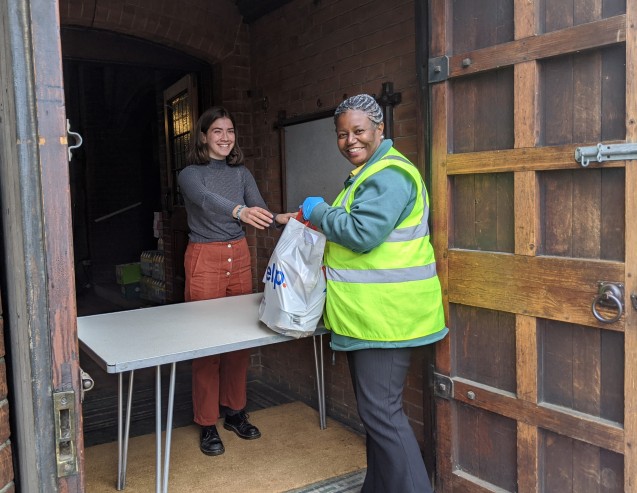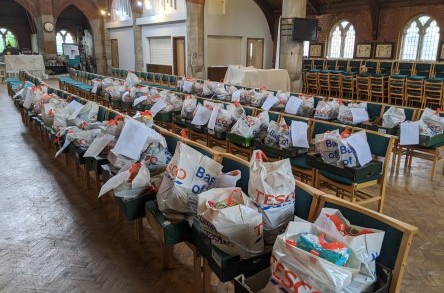
At the beginning of April, two Ealing charities struck up a partnership to turn an essential food lifeline into a lockdown delivery service. Three months later, ECT has just made its 1,000th delivery for Ealing Foodbank – and shipped more than 12 tonnes of food to hungry families in the process.
Foodbanks are an absolute lifeline for hungry families and individuals who have fallen on hard times. But for single parents living miles away from the only open distribution centre, or those stuck inside shielding from the coronavirus, accessing that lifeline has been more difficult than ever during the past months of UK lockdown.
Thanks to a special delivery service by charities Ealing Foodbank and Ealing Community Transport (ECT) working together as part of the Ealing Together partnership, hundreds of local families and individuals have been able to keep the wolf from the door.
Twice a week, every week since the beginning of April, ECT’s buses have loaded up with half a tonne of food and other essential supplies, such as toiletries and nappies, and weaved their way across the borough, dropping them off at people’s front doors.
Ealing Foodbank has a clear mission: “We don’t think anyone in our community should have to face going hungry.” Part of a nationwide network of foodbanks supported by The Trussell Trust, it provides nutritionally balanced emergency food and support to local people in crisis who are referred by a wide range of different organisations – from council welfare services, to schools and GP surgeries.
While this mission could not perhaps have been more critical during recent months, the challenge of fulfilling it was tested from the beginning. Janet Fletcher, manager of Ealing Foodbank, explains that when the lockdown was imposed on 23 March, her team had no option but to close centres across the borough – in Southall, Northolt, Acton, Greenford and Ealing Green.
Only one centre has remained open: St Mellitus Hall in Hanwell. But opening times have had to be restricted, and those referred to the service have had to queue outside, come rain or shine – with some shelter in the form of a garden gazebo! – while staff fetched their supplies. It’s a far cry from the normal set-up, in which Foodbank visitors could come inside for a sit down, a warm drink and someone to talk to, and volunteers could signpost them to agencies able to solve their longer-term issues.
But times of great challenge can also be opportunities for innovation and partnership – and St Mellitus has also become a distribution centre for twice-weekly home delivery runs made by ECT minibuses.
 “Home delivery is available on Tuesday or Friday and is an essential service for many of those who are referred to us,” says Janet. “We ask what people want, receive requests and create a list for the delivery day, which we then send to ECT. ECT do all the hard work to calculate how many buses we need, what routes they will take – I don’t know how they do it but somehow it works!”
“Home delivery is available on Tuesday or Friday and is an essential service for many of those who are referred to us,” says Janet. “We ask what people want, receive requests and create a list for the delivery day, which we then send to ECT. ECT do all the hard work to calculate how many buses we need, what routes they will take – I don’t know how they do it but somehow it works!”
The Foodbank and ECT had talked before about a possible partnership – but the coronavirus provided the catalyst to turn talk into action.
“I knew [chief executive] Anna Whitty through being involved in Ealing Together,” says Janet. “It’s just been brilliant to have ECT making our deliveries. We have all had to adapt and change the way we do things but I am just really grateful for ECT’s engagement in helping us get the deliveries out there. I think the way the charities have pulled together in all sorts of ways has been quite heart-warming.”
Charities are often thought of as being “warm and fuzzy” by the general public, observes Janet – but she says the level of professionalism and organisation displayed by both ECT and Ealing Foodbank is something to be admired and appreciated.
“In a way I think I have been surprised that ECT is a charity,” she admits. “It comes across as being very well organised but also having such strong values… I think one of the big differences between ECT and a commercial delivery service, for example, is that we can build in time with ECT. The pressure isn’t on targets or doing a number of deliveries in a certain amount of time – it is about valuing staff and volunteers, and about wanting to get food to somebody in need.”
She recounts one instance where somebody lived in a tenth-floor flat and could not come down to collect the food for health reasons – but the ECT team made sure it was delivered to the front door, even if it was on the tenth floor.
Now that that lockdown restrictions are easing, the Foodbank is also working on getting things back to normal. But with many of its volunteers over 70, its other locations around the borough are likely to be closed for a while yet. The ‘new normal’ will need different solutions, and Janet is hoping that the delivery service will be able to continue.
For ECT, it’s an important example – among many during the crisis – of the way in which community transport can provide solutions for the most vulnerable and needy in society, and another partnership that it is keen to maintain and develop into the future.
As Chief Executive Anna Whitty MBE comments: “So many people are living near or below the breadline and Covid-19 has only worsened the situation, pushing more families and individuals into poverty. As we consider our role as a charity in establishing the ‘new normal’, we will continue to step up to the challenge, and to work with partners to support the most vulnerable in our communities.”